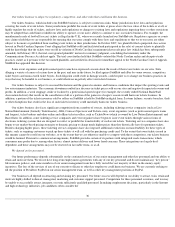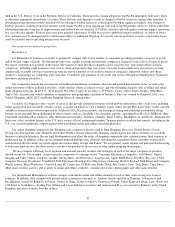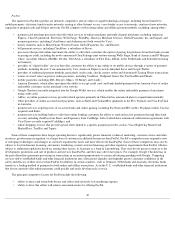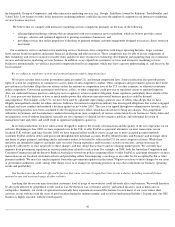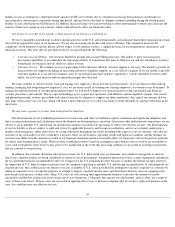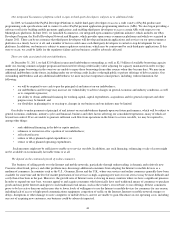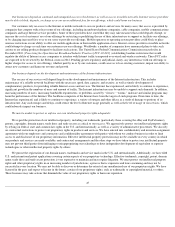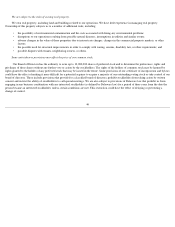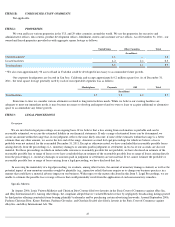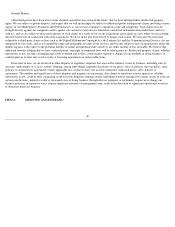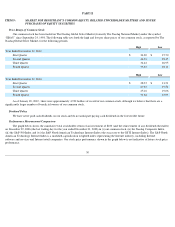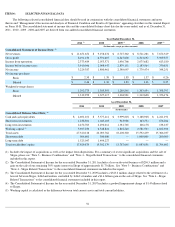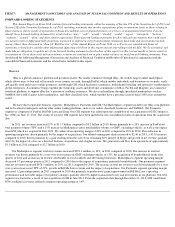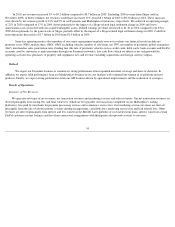eBay 2011 Annual Report Download - page 50
Download and view the complete annual report
Please find page 50 of the 2011 eBay annual report below. You can navigate through the pages in the report by either clicking on the pages listed below, or by using the keyword search tool below to find specific information within the annual report.
Our businesses depend on continued and unimpeded access to the Internet, as well as access to mobile networks. Internet service providers
may be able to block, degrade, or charge us or our users additional fees for our offerings, which could harm our business.
Our customers rely on access to the Internet or mobile networks to use our products and services. In many cases, that access is provided by
companies that compete with at least some of our offerings, including incumbent telephone companies, cable companies, mobile communications
companies and large Internet service providers. Some of these providers have stated that they may take measures that could degrade, disrupt, or
increase the cost of customers' use of our offerings by restricting or prohibiting the use of their infrastructure to support or facilitate our offerings,
or by charging increased fees to us or our users to provide our offerings. Mobile operators or operating system providers could block or place
onerous restrictions on our ability to offer our mobile applications in their mobile application stores. Internet service providers or mobile networks
could attempt to charge us each time our customers use our offerings. Worldwide, a number of companies have announced plans to take such
actions or are selling products designed to facilitate such actions. The United States Federal Communications Commission enacted rules in
December 2010 ( Preserving the Open Internet Broadband Industry Practices [FCC-10-201] ) establishing baseline restrictions that would
regulate the ability of Internet access companies to interfere with Internet traffic transported over wired and wireless networks. These FCC rules
are expected to be reviewed by the Federal courts in 2012. Pending greater regulatory and judicial clarity, any interference with our offerings or
higher charges for access to our offerings, whether paid by us or by our customers, could cause us to lose existing customers, impair our ability to
attract new customers and harm our revenue and growth.
Our business depends on the development and maintenance of the Internet infrastructure.
The success of our services will depend largely on the development and maintenance of the Internet infrastructure. This includes
maintenance of a reliable network backbone with the necessary speed, data capacity, and security, as well as timely development of
complementary products, for providing reliable Internet access and services. The Internet has experienced, and is likely to continue to experience,
significant growth in the numbers of users and amount of traffic. The Internet infrastructure may be unable to support such demands. In addition,
increasing numbers of users, increasing bandwidth requirements, or problems caused by “viruses,” “worms,” malware and similar programs may
harm the performance of the Internet. The backbone computers of the Internet have been the targets of such programs. From time to time, the
Internet has experienced, and is likely to continue to experience, a variety of outages and other delays as a result of damage to portions of its
infrastructure. Any such outages and delays could reduce the level of Internet usage generally as well as the level of usage of our services, which
could adversely impact our business.
We may be unable to protect or enforce our own intellectual property rights adequately.
We regard the protection of our intellectual property, including our trademarks (particularly those covering the eBay and PayPal names),
patents, copyrights, domain names, trade dress and trade secrets as critical to our success. We aggressively protect our intellectual property rights
by relying on federal, state and common law rights in the U.S. and internationally, as well as a variety of administrative procedures. We also rely
on contractual restrictions to protect our proprietary rights in products and services. We have entered into confidentiality and invention assignment
agreements with our employees and contractors and confidentiality agreements with parties with whom we conduct business in order to limit
access to and disclosure of our proprietary information. Effective intellectual property protection may not be available in every country in which
our products and services are made available, and contractual arrangements and the other steps we have taken to protect our intellectual property
may not prevent third parties from infringing or misappropriating our technology or deter independent development of equivalent or superior
technologies or other intellectual property rights by others.
We pursue the registration of our domain names, trademarks and service marks in the U.S. and internationally. Additionally, we have filed
U.S. and international patent applications covering certain aspects of our proprietary technology. Effective trademark, copyright, patent, domain
name, trade dress and trade secret protection is very expensive to maintain and may require litigation. We must protect our intellectual property
rights and other proprietary rights in an increasing number of jurisdictions, a process that is expensive and time consuming and may not be
successful in every location. We may not be able to discover or determine the extent of any unauthorized use of our proprietary rights. We have
licensed in the past, and expect to license in the future, certain of our proprietary rights, such as trademarks or copyrighted material, to others.
These licensees may take actions that diminish the value of our proprietary rights or harm our reputation.
45



